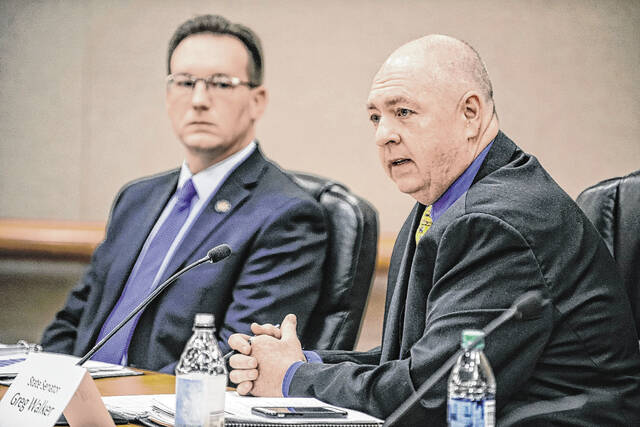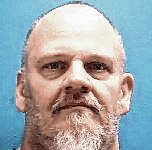
Mike Wolanin | The Republic State Sen. Greg Walker addresses issues related to legislation during a Third House session with state legislators in the council chambers at Columbus City Hall in Columbus, Ind., Monday, March 25, 2019.
Proposed bills dealing with what students may be taught – and what students should be permitted to read – received considerable attention during Monday’s Third House Session.
Sponsored by the Columbus Area Chamber of Commerce, about 67 people participated in the video conference via Zoom Monday. Third House sessions allow constituents to hear directly from state lawmakers about pending legislation in the Indiana General Assembly.
At the halfway point of this year’s session, all House bills have either made it through the chamber or are likely dead for this year, State Rep. Ryan Lauer, R-Columbus, said. Out of 439 bills filed, 105 have been passed by the House and sent over to the Indiana Senate, Lauer said.
Lauer and Rep. Jim Lucas, R-Seymour, have voiced support for House Bill 1134, authored by State Rep. Tony Cook, R-Cicero. Chamber president Cindy Frey described the measure as preventing the teaching of subjects in a way that “causes any individual to feel discomfort, guilt, anguish or any form of psychological distress.”
The bill also limits what teachers can say in class regarding sensitive subjects, prohibiting them from using materials that “present any form of racial or sex-stereotyping or blame on the basis of sex, race, ethnicity, religion, color, national origin or political affiliation.”
During the session, Sen. Greg Walker, R-Columbus, says he’s not supportive of the language in HB 1134, adding he doesn’t see much about the bill that he wants to move forward in the Indiana Senate.
Walker said he read a book written for fifth graders that one of his adult constituents told him was distressful – even for adults.
“I agree that education should be uncomfortable sometimes,” Walker said. “I was forced to face parts of American history that are not pleasant to examine, but I did not find this book to have any hidden or open agenda that would have been inappropriate for fifth graders to study.”
A twin measure – Senate Bill 167 – died in the Senate earlier this month. HB 1134 is being sponsored in the Indiana Senate by Sen. Linda Rogers, R-Elkhart. Walker says Rogers is working on finding alternative language for the proposal.
Lauer has said there is nothing in the measure that prevents educators from teaching history, including its “evils and ills.” The proposed legislation just doesn’t allow teaching that a particular group of people are to blame for social problems and divisiveness, Lauer said. He adds the bill also protects teachers if administrators are pushing divisive concepts that go against a teacher’s personal values.
The focus of HB 1134 is to empower parents to have a stronger voice in the schools through an advisory board, as well as the online posting of lesson plans, Lauer said. Teachers across the state have said that information is already available to every school patron in Indiana grade level curriculum requirements posted online.
Book censorship
Also discussed was Senate Bill 17, authored by Sen. Jim Tomes, R-Wadesville. Passed by the Senate 34-15 and now being considered in the House, the proposed legislation would open the door to prosecution of public librarians and K-12 librarians schools over materials or books considered harmful to minors, including those which contain violence, pornography or obscenities.
Frey brought up a sentiment expressed in “The Republic” by Bartholomew County Library director Jason Hatton, who described the notion of jailing a librarian for having materials somebody else doesn’t believe in as “chilling.”
When questioned, Lauer emphasized he wants to hold off on making a final judgement on SB 17 until changes are made in a House committee.
“But in my reading, (the bill) is not focusing on books on the shelf as much as giving or soliciting age-inappropriate, sexually explicit, pornographic materials to minors,” Lauer said. “We’re not talking about “Catcher In The Rye” or other literature.”
The measure uses the U.S. Supreme Court definition of obscenity, which is something that encourages an excessive interest in sexual matters – is completely devoid of scientific, political, educational or social value – and violates local community standards, the Columbus lawmaker said.
The bill’s author, however, says it is about “books.” Sen. Jim Tomes, R-Wadesville, the Indiana bill’s author, has insisted that SB 17 seeks to ensure that minors can’t access “repugnant” and “absolutely disgusting” materials but does not change current state law on what is harmful to minors, The Associated Press reported.
“These are not classic novels, renaissance pictures, excerpts from the Bible,” Tomes said. “This is not about guns. It’s not about communism. It’s about raw, nasty, filthy pornographic literature. Books.”
School bus safety
During his opening address Monday, Walker cited Senate Bill 69, authored by Sen. Rick Niemeyer, R-Lowell. If approved, the bill would impose a $1,000 fine on motorists who pass a stopped school bus while children are boarding or exiting.
The measure has passed the Senate 38-11, but only after the measure was amended to ensure that an infraction would not taken any points off a driver’s license, Walker said. The bill is being studied in the House.
Finally, Frey brought up House Bill 1002, co-authored by Rep. Tim O’Brien, R-Evansville. Advocates say the measure would put $1.3 billion back in Hoosiers’ pockets. In addition, the state would get the largest tax cut in state history if the state budget reserves hit a record $5 billion at the end of fiscal year 2022. which passed out of the House and is now in committee.
But an online questioner said she’s concerned the bill will shift the tax burden to households over time. Democrats say the majority of tax cuts in the bill invests in manufacturers and well off Hoosiers – not the average taxpayer.
In reading an email, Frey said the questioner felt that HB1002 was just another tax break for the rich.
“Well, you can’t tax people who don’t have the money because there’s no future in that,” Walker replied. “Any tax break, I would argue, is for the rich because, in Indiana, we don’t do a lot in trying to rebalance the tax structure to make it more impactful at the lower end.”




